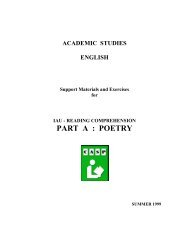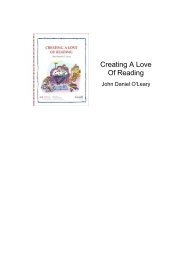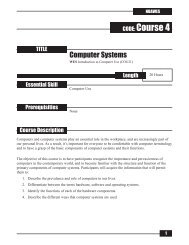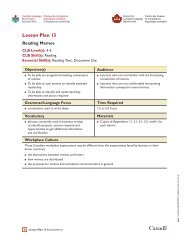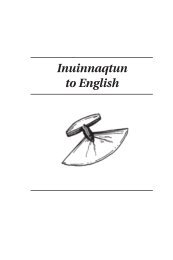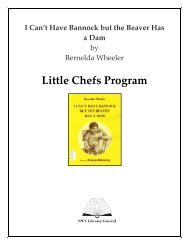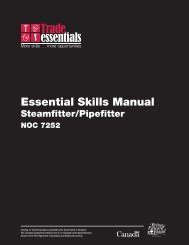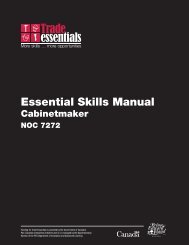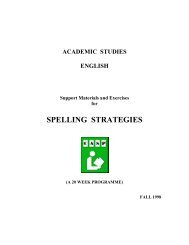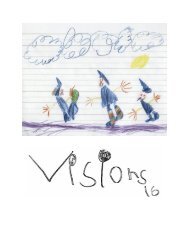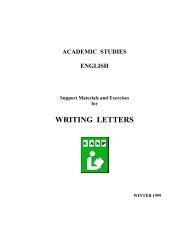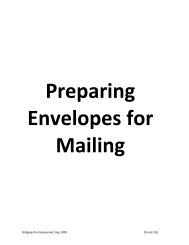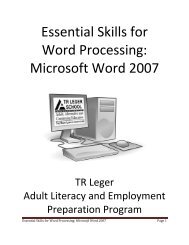Integrating Essential Skills into Training - National Adult Literacy ...
Integrating Essential Skills into Training - National Adult Literacy ...
Integrating Essential Skills into Training - National Adult Literacy ...
Create successful ePaper yourself
Turn your PDF publications into a flip-book with our unique Google optimized e-Paper software.
<strong>Essential</strong> <strong>Skills</strong> Research Project (ESRP)<br />
• national HRDC research study (1994 – 2003)<br />
<strong>Essential</strong> <strong>Skills</strong> & Workplace <strong>Literacy</strong> Initiative<br />
• examined how the 9 essential skills were used in a variety launched April 1, 2003<br />
of occupations and how to talk about these skills<br />
being implemented by HRSDC<br />
• more than 3,000 interviews across Canada<br />
• almost 200 occupations requiring a high school diploma<br />
or less and on-the-job training were addressed<br />
goal is to enhance the skill levels of Canadians who<br />
are entering – or are already in – the workforce<br />
• developed ways to measure difficulty levels (adapted the<br />
IALS scales)<br />
responsible for profiling the A and B occupational<br />
bands of the NOC (trades and occupations requiring<br />
post-secondary education)<br />
• resulted in profiling methodology and ES profiles (posted<br />
on the website for use by trainers and administrators)<br />
• collected authentic workplace documents for trainers<br />
• reading text<br />
• using documents<br />
www.hrdc.gc.ca/essentialskills<br />
<strong>Essential</strong> <strong>Skills</strong><br />
HRSDC Classifications<br />
• thinking skills<br />
• problem solving<br />
profiles are being posted on the website<br />
www.hrdc.gc.ca/essentialskills<br />
Time to Take a Run At It…<br />
• decision making<br />
• writing <strong>Essential</strong> <strong>Skills</strong> Application<br />
• critical thinking<br />
• numeracy • job task planning and organizing (“Teachability”)<br />
• oral communication • significant use of memory<br />
• computer use<br />
• finding information<br />
• working with others • continuous learning<br />
Activity:<br />
www15.hrdc-drhc.gc.ca <strong>Essential</strong> <strong>Skills</strong> Use re: a form<br />
• Look at the form (both sides) called “Van Isle<br />
Windows Ltd.”<br />
<strong>Essential</strong> <strong>Skills</strong> and “Teachability”<br />
“What you Teach” <strong>Essential</strong> <strong>Skills</strong> (the skills that can be<br />
addressed directly as subject matter) reading text,<br />
• List all the skills or tasks you would have to address document use, writing, numeracy, computer use<br />
if you were teaching someone how to complete this<br />
form. (Use the answer sheet provided.) “How you Teach” <strong>Essential</strong> <strong>Skills</strong> (the skills that are<br />
• Indicate to which HRSDC <strong>Essential</strong> <strong>Skills</strong> category or<br />
categories the task or skill belongs.<br />
• Be prepared to present your findings to the large<br />
group.<br />
• Building transferabiltiy: SkillBuilder on entry forms<br />
• Reflection: how to apply to your own training<br />
addressed indirectly as delivery processes when teaching<br />
other subject matter) problem solving, decision making,<br />
critical thinking, working with others, job task planning<br />
and organizing, continuous learning<br />
“Half Half” <strong>Essential</strong> <strong>Skills</strong> (the skills addressed both<br />
directly as subject matter and reinforced via delivery<br />
processes of other subject matter) oral communication,<br />
finding information, significant use of memory



